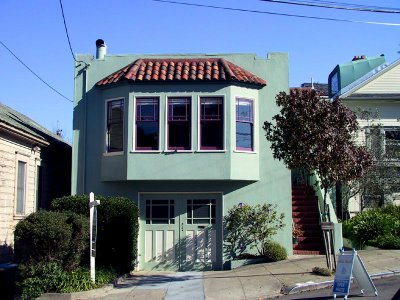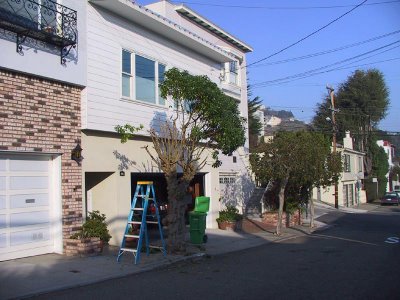To start reading this series of postings from the beginning,
click here and
then click Next at the end of each installment.
When we got back to San Francisco, I could take it easy — I was unemployed. It was December 15, and the only things I had to do were to help decide whether to cancel the house purchase contract in France and to think about looking for a new job. Walt was working as a consultant for a public transportation consulting group, so he had plenty to do. He liked his work and, especially, the people he worked with. His “office” was his computer room in the house and he did a lot of his work via e-mail. It was a nice situation.
 How would you like to live at the bottom of this hill in San Francisco?
How would you like to live at the bottom of this hill in San Francisco?What if the brakes on one of these vehicles failed?
After three or four days of just letting the whole French house-hunting experience sink in, we came to the conlusion that we weren’t going to back out of the deal — we were going to put down a deposit on the house at La Renaudière. Even if I decided to go back to work in California (and there wasn’t much I could do about that immediately, since Christmas is a terrible time to look for work), we thought we could pull together the necessary funds to buy it. We could always go there on vacations, as often as possible, and fix the place up over time.
Late that week, I went to the bank and asked to have the deposit money wired to the real estate agency in Montrichard. Mr. Bourdais had given me his bank information for that purpose. I remember I was upset at how “bad” the exchange rate was at that point.
The previous spring, we had been able to buy euros for $0.87 when we were spending two weeks in Paris. That meant that a €30 meal in a restaurant only cost about $25. We got a big discount on everything, we felt, and our dollars went a long way. Paris prices seemed very reasonable by San Francisco standards.
The dollar and the euro reached parity in December 2002. That made it easy for us to evaluate French house prices, because the price in euros was the same as the price in dollars. However, the dollar continued slipping. It seems funny now, when a euro costs about $1.20, that I was upset because I had to pay the bank’s exchange rate of $1.06 per euro when I sent the deposit money. On $10,000, for example, that’s $600 extra. And then there was a $90 fee on top of that for processing the transfer.
I clenched my teeth and sent off the money. I told Walt that even if we ended up losing that money — if we canceled the deal and forfeited the deposit — it would have been worth it and, in the grand scheme of things, our lives would not be fundamentally altered. It was a risk we needed to take, in other words.
So it was done and we were that much farther along in the process.
One of the things I used to enjoy doing every weekend in San Francisco was going to open houses in our neighborhood to see what houses were selling for and what you would get for your money. I don’t know how it works in other places, but in SF a lot of houses for sale are open for viewing by prospective buyers, not to mention neighbors and the simply curious, on Sunday afternoons. Some Sundays I would do a walking tour of the neighborhood to see houses, and on some Sundays I would get in the car and expand my viewing area some.
At an open house, a real estate agent is there to keep an eye on things and give out information. The people who live in the house are never there, or only very rarely. I don’t know if having open houses on weekends is standard practice in other parts of the U.S. Here in the Loire Valley, there are no open houses that I’m aware of. And often, when you go with an real estate agent to see a house for sale, the owners are at home. For me, that makes in harder to get a feel for the place. The owners are busy trying to show off the features they think are most attractive — “Look at this beautiful shag carpet — it’s like new!” — and the potential buyer has to be careful what he or she says, for fear of hurting somebody’s feelings.
One Sunday, right after I had sent the deposit off to France to hold the house we thought we might buy, I went out to open houses one more time. Probably, in the back of my mind, I had the idea of comparing the houses I would see with the one we were living in, and figuring out what our house might sell for. I went to see a house on Diamond Heights Boulevard. It was located just a few hundred meters from the end of Congo Street, which we lived on, and just where Elm Street turns into Diamond Heights Boulevard.
It was a very nice house, quite spacious, and the asking price was pretty high, I thought. But real estate was booming in San Francisco in late 2002 and early 2003. What did I know? More importantly, I was the only visitor at the open house at that particular moment, and I had a chance to spend some time talking to the agent who was in charge. She was a Scottish woman and she was easy to talk to. I ended up telling her that I was thinking about selling my house and was wondering what price I should ask for it.
That was the beginning, I guess, of the end of living in San Francisco. The agent said she would be glad to come look at my house in Janurary and give me her opinion about an asking price.
The idea was taking shape in our minds. It still seemed like an audacious thing to do -- sell the house (or “cash out,” as Californians called it) and move away.
For Christmas, some of our best friends in California, people we had spent holidays with since 1986, came to our house for a gift exchange and a good dinner. It’s funny, I don't have any pictures from that particular Christmas. I don’t know why.
Meanwhile, Walt and I decided to have some work done in the house in January, figuring that having everything clean and spiffed up would make the place easier to sell if we decided to sell it. If we decided not to sell it, it would be nice to have everything clean and spiffed up anyway. We ended up having the master bedroom and bathroom painted, and we had a neglected area of the downstairs family room fixed up and painted too. We put in some new light fixtures and some new bathroom faucets. We started cleaning up and cleaning out in a serious way and decided to have a garage sale to get rid of a bunch of junk that we really didn’t need any more. Our friend Sue offered to help us with the garage sale.
In January, the Scottish real estate agent and a colleague of hers came to the house and gave us an evaluation. They were enthusiastic about the opportunity to sell the house. But we needed to get more opinions. I met another real estate agent at another open house around that time and asked her to come over and give us her opinion too. Then we decided to call the agent who had helped us buy the place in 1995 to get her professional opinion. We trusted her, but we weren't sure she would be enthusiastic about selling our 1960s-style house. We thought she was more interested in older houses.
Of the three agents, representing three different companies, we ended up choosing the agent who had helped us buy the house in the first place. She worked for a local real estate company, one that specialized in San Francisco houses. I liked the Scottish agent, but she was really focused on and experienced in the San Mateo area, 20 miles south of San Francsico. And the other agent we had talked to worked for a big national company — we didn't get the impression that she or that company had a good grasp of the realities of San Francisco houses and prices.
So we had decided to put our house on the market. We told the realty company what we thought it was worth, but they wanted us to ask less. They said finding the right price was the key to a successful sale. The price had to be realistic, and be low enough to inspire potential buyers to make an offer. The longer a house stayed on the market, they said, the lower the final price would be. It was important to sell it fast. In the market at that time, many houses were selling for prices above the asking price. If you could get buyers to start bidding on the house, you were likely to get the best offers.
Meanwhile, one of us needed to go back to France to sign some papers required for the purchase. Since I was unemployed, I volunteered.







No comments:
Post a Comment
What's on your mind? Qu'avez-vous à me dire ?